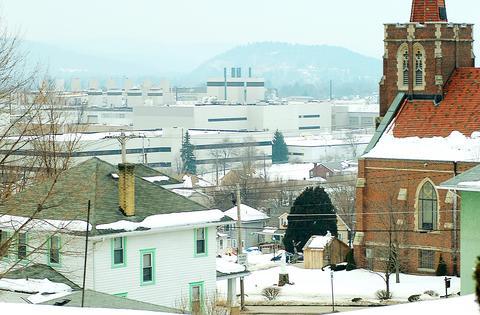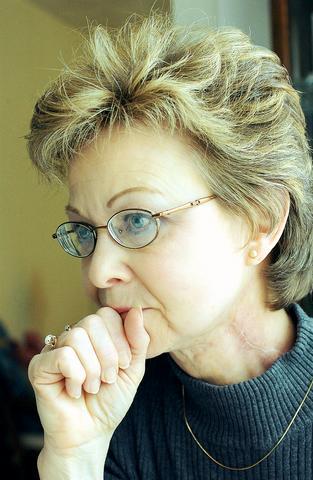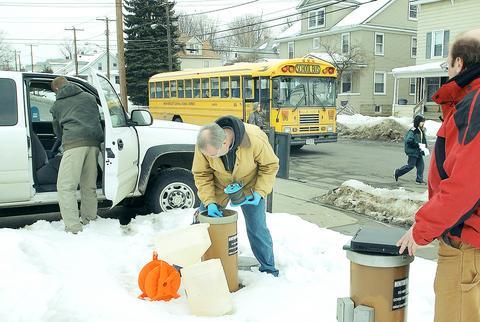This village, best known as the birthplace of IBM, has an unusual look these days. Venting systems, with white plastic tubing that runs from basements to roofs, sprout from 377 houses and businesses. Many houses are for sale, but there are few buyers.
"This area is taboo now," said Tim Davis, who lives on Monroe Avenue. "And it's going to stay that way."
Davis lives in what residents call "the plume" -- 129.5 hectares encompassing the downtown area and stretching across the village, all of which were polluted by industrial toxic substances. The chemicals contaminated soil and leached into groundwater. And they continue to produce vapors that waft into hundreds of basements.

PHOTO: NY TIMES
Occurring over decades, the pollution is traceable at least in part to IBM, which used common solvents in its circuit board assembly.
The venting systems were all paid for by IBM, which two decades ago employed 12,000 workers in Endicott. Now 1,700 collect IBM paychecks here. Still, residents say they feel trapped in virtually unsellable homes, where they fear the prolonged effects of the vapors on the health of their families.
"Your house acts as a kind of chimney" for the vapors, which have tested positive for the contaminant trichloroethene, or TCE, said Alan Turnbull, 69, who in 2002 created the Residents Action Group of Endicott, also known as RAGE, after his wife, Donna Turnbull, 57, was found to have throat cancer. Donna Turnbull does not smoke, and she used to exercise regularly in her finished basement. Now, she rarely ventures down the basement stairs.

PHOTO: NY TIMES
That the TCE found in Endicott, a suspected carcinogen, has been measured at very low levels is scant comfort to those worried about more than two decades of exposure. "Oh, sure, we're scared to death," said Donna Turnbull, who has lived in her Cleveland Avenue home for 21 years. "We know the chemicals are dangerous, but we don't know how dangerous or the long-term effects."
Results of air-quality tests from homes in 2002 prompted the state to announce in January that the Endicott pollution was more serious than previously believed.
The New York Department of Environmental Conservation said it would upgrade Endicott's status from Class 4 -- meaning that the pollution source is no longer a problem, but is still being monitored -- to Class 2 -- a significant threat to the environment or health. The reclassification, backed by US Representative Maurice Hinchey, a Democrat who represents the area, was a victory for citizen groups.

PHOTO: NY TIMES
Despite the change, state health officials cannot say whether air or water pollution in Endicott has actually caused any health problems.
Village officials say tests show that the water is safe to drink And the venting systems are effective, according to Michael Fraser, a spokesman for the Department of Environmental Conservation. Still, many residents remain pessimistic.
"This is going to become a dead town, no doubt about it," said Matt Latessa, 62, who owns a house in the plume and a men's hair salon on Monroe Avenue. Aging business owners such as Latessa, who wants to move to Florida, and families that bought starter homes in the plume feel trapped. "We're being held hostage," he said.
No buyers
Along with for-sale signs on front lawns, the venting systems, which emit a humming sound, have become a fact of life. Davis' house on Monroe Avenue, in the heart of the plume, is one of those that is vented.
"If you noticed, there's a Remax sign in front of my home," said Davis, who is troubled by persistent eye irritation. "I put it there instantly" after learning of the vapor problem, he said, but he added that he has had no offers for the house.
Fraser said vapor intrusion was one of the factors that made the Endicott situation unique.
"In past years, the guidance provided to regulatory agencies indicated that established cleanup levels were also protective for indoor air," Fraser said. "Advances in science and technology have recently shown that vapor intrusion concerns can accompany TCE-contaminated groundwater at very low levels."
For more than two decades, IBM used liquid cleaning agents in its circuit board assembly operation. A half-dozen spills and leaks, including a documented 1979 leak of 15,520l from an underground tank, left behind volatile organic compounds in the town's soil and aquifer. Trace elements of volatile organic compounds have been found in the city's drinking water , but the levels are within regulatory limits.
To date, IBM's former campus has been identified by the Department of Environmental Conservation as the major source of pollution, Fraser said. However, the state agency has also traced some contaminants to a local dry cleaner and is seeking out other polluters.
Since 1980, IBM has pumped out 78,000 gallons of chemicals, including trichloroethane, trichloroethene, Freon, benzene and perchloroethene. The village is now dotted with 342 wells, paid for by IBM, that monitor or extract groundwater.
IBM has already spent "tens of millions" and has pledged to work with the village, said a company spokesman, Todd Martin. "We are going to proceed through this project as a partner with the community and other stakeholders," Martin said.
Before IBM installed the venting systems early last year, "we met one on one with residents at their kitchen tables. We want to connect with people," said Martin.
Opinion is divided on whether IBM, which sold all its Endicott real estate but leases land for its operations there, remains a familiar good neighbor or has become a disengaged corporate parent. Endicott never served as IBM headquarters, but is called the company birthplace because that is where the first plant was built.
"There are two IBMs," Turnbull said. "In their early days, their philosophy was to take the best care of their employees." By the 80s, he said, "a new IBM came forward. That's the one that cares about the bottom line."
The village's mayor maintains that working with IBM is the best way forward. "I say, thank God IBM is here to take care of this mess," Mayor Joan Hickey Pulse said. Residents should not lose sight of the fact that spills and leaks were accidental, she said. The mayor rejects the notion that Endicott is on the ropes. "We're not going to put up gates and say Endicott is closed," she said. "Endicott is not going to go away."
Suspicious cancer cases
Citizens continue to pack monthly forums held by the Department of Environmental Conservation and the state Department of Health. Among other things, the community has reached an agreement with the state Department of Health and the federal Agency for Toxic Substances and Disease Registry to conduct a study profiling the health of villagers and looking at cancer cases and other illnesses.
Cancer comprises a complex range of diseases with varying triggers, including old age. Connecting individual cases to environmental exposure is problematic, a fact acknowledged by Bernadette Patrick, who helped organize Citizens Acting to Restore Endicott's Environment.
Patrick said she has never been "a save-the-planet kind of person." But that changed after her daughter, Nicole Brinsko, was found to have Hodgkin's lymphoma at 17, which announced itself with a large swelling on her neck.
"I have a heightened awareness now," said Patrick, a nurse whose mother worked for IBM. "I see how bad it can get."
Patrick began to ask questions after she contacted another mother whose teenage daughter also grew up on Tracy Street and who developed bone cancer. Nicole is now in college and is growing a head of baby-fine black hair.
"Having cancer when you are 17 and wearing a wig to the senior prom is not normal," she said. "The whole situation isn't normal."
Today IBM's once impressive campus has a deserted look. But people have not forgotten the good old days.
"In the '60s and '70s, IBM took care of the area," said Edward Blaine, a Deacon at St. Ambrose Catholic Church in downtown Endicott and a member of RAGE. "We had things other communities didn't have: weekly concerts, the carousel and the golf course. We went from being a great place to raise a family to where we are today. Now that choice has a dark side to it."

April 28 to May 4 During the Japanese colonial era, a city’s “first” high school typically served Japanese students, while Taiwanese attended the “second” high school. Only in Taichung was this reversed. That’s because when Taichung First High School opened its doors on May 1, 1915 to serve Taiwanese students who were previously barred from secondary education, it was the only high school in town. Former principal Hideo Azukisawa threatened to quit when the government in 1922 attempted to transfer the “first” designation to a new local high school for Japanese students, leading to this unusual situation. Prior to the Taichung First

The Ministry of Education last month proposed a nationwide ban on mobile devices in schools, aiming to curb concerns over student phone addiction. Under the revised regulation, which will take effect in August, teachers and schools will be required to collect mobile devices — including phones, laptops and wearables devices — for safekeeping during school hours, unless they are being used for educational purposes. For Chang Fong-ching (張鳳琴), the ban will have a positive impact. “It’s a good move,” says the professor in the department of

On April 17, Chinese Nationalist Party (KMT) Chairman Eric Chu (朱立倫) launched a bold campaign to revive and revitalize the KMT base by calling for an impromptu rally at the Taipei prosecutor’s offices to protest recent arrests of KMT recall campaigners over allegations of forgery and fraud involving signatures of dead voters. The protest had no time to apply for permits and was illegal, but that played into the sense of opposition grievance at alleged weaponization of the judiciary by the Democratic Progressive Party (DPP) to “annihilate” the opposition parties. Blamed for faltering recall campaigns and faced with a KMT chair

Article 2 of the Additional Articles of the Constitution of the Republic of China (中華民國憲法增修條文) stipulates that upon a vote of no confidence in the premier, the president can dissolve the legislature within 10 days. If the legislature is dissolved, a new legislative election must be held within 60 days, and the legislators’ terms will then be reckoned from that election. Two weeks ago Taipei Mayor Chiang Wan-an (蔣萬安) of the Chinese Nationalist Party (KMT) proposed that the legislature hold a vote of no confidence in the premier and dare the president to dissolve the legislature. The legislature is currently controlled